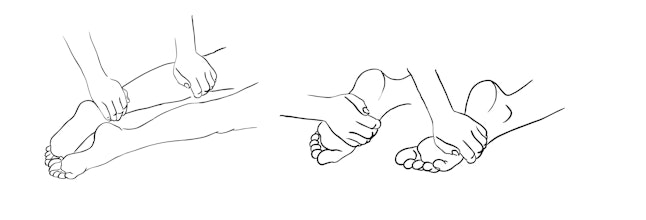ARTICLE FROM: https://www.mic.com/p/the-benefits-of-massage-separating-fact-from-fiction-19422070
Written By: Tracey Anne Duncan
The benefits of massage are widely touted by influencers, the self help obsessed, and everyone else wholly consumed by the wellness industrial complex.. As a person who has been a practicing body worker (what massage therapists call themselves) for many years, I am always tempted to say that massage is the cure for what ails you.
The self-care movement has inducted thousands of freshly minted massage therapists into the industry who promise relief for everything from anxiety to xenophobia. I have been starting to wonder whether massage can follow through on all the promises these newbies are making. I used my own experience, plus some mighty (and somewhat damning) research to separate fact from fiction when it comes to the health benefits of massage.
Sports Performance
During the course of my career, I have worked with athletes of every ilk, from professional boxers to amateur runners. I have always thought of massage as a good way for athletes to both enhance performance and recover from events. Massage is proven to be relaxing to the nervous system without any of the side effects of anti-anxiety pharmaceuticals; that fact has led me to assume that it would help athletes chill out both before and after an event.
After doing some research, I was surprised to find that my logic isn’t necessarily sound. The impacts of massage don’t appear to be measurable in a way that impacts athletic performance. Clinical research on sports massage showed no demonstrable benefits in reducing muscle soreness, enhancing performance, or shortening recovery time. Real talk, I feel pretty bummed about this and also a little guilty for all the athletes I’ve recommended massage to.
It’s worth mentioning though, that even if regular massages don’t transform you into an MVP, kneading out knots does make athletes feel better — less sore, less tight, etc. And that physical relief can be huge for people who put their bodies through a lot.
Posture
The woo-iverse is replete with reviews written by people who say that massage helped “fix” their posture. I take issues with these claims. First of all, let’s talk about what posture is. Simply put, posture is how you habitually hold your bones and muscles. “Bad” posture is when you habitually hold yourself in a way that takes the bones and muscles out of alignment with each other. Poor posture can lead to discomfort in the neck, shoulders, low back, jaw, and buttocks.

Shutterstock
It’s totally true that improving your posture can reduce discomfort. The problem is that reducing discomfort is not the same thing as actually changing your posture. In other words, yes, you can go get a massage to alleviate pain due to poor posture and you will probably feel better afterwards, but that’s a short-term solution to a long-term problem.
If you want to see real changes in your posture, you’re going to have to commit to seeing a therapist who is specifically trained to help you do that for a lengthy period of time. If you go to see a structural alignment specialist (also sometimes referred to as a “Rolfer”), they will usually ask you to commit to 10 one-hour sessions, which is what have been shown to garner results.
If you want to see real change, you can’t walk into your corner massage quick-stop like a hunchback and expect to walk out holding your head high. Massage can help posture, but we have to adjust our expectations about what can be achieved during a period of time.
Trauma
I am really happy with all the conversations that are happening about trauma — it’s time we dropped the stigma and started healing. But ever since it’s become a buzzword, I have seen a troubling number of specious trauma therapies pop up. Here’s the thing: Body therapies are an important part of trauma recovery. Most trauma therapists see that trauma both has physiological effects on the body and can also be healed through mind-body therapies. But massage, on its own, is not an effective treatment for trauma.
In fact, being touched can be triggering for some trauma survivors. Not all massage therapists are trained to deal with trauma. A trauma-informed massage credential can be earned in only four hours of coursework, and that, without significant experience to back it up, may not be enough to handle the variety of responses an individual can experience when they are having a traumatic flashback.
All that being said, massage may make a person who is feeling isolated and alone feel better. That’s real. If you have trauma, please be sure to communicate with your therapist about your experience both before, during, and after the session. If you want to do body-based work to heal from trauma, Somatic Experiencing is not massage exactly, but it is a physical technique that has been shown to help folks heal from trauma. You best move is to supplement massage with talk therapy or meds, if you need them, in order to get the best results.
So what is massage actually good for?
While I was surprised to find that some of my assumptions about the benefits of massage were a bit exaggerated, I was happy to find that other ideas were confirmed. Massage is great for pregnancy and labor. It has also been clinically shown to relieve symptoms of anxiety and depression (oh hey, serotonin boost).
Perhaps most importantly, in this loneliness epidemic, massage can help lower the cortisol levels of those who may be touch-deprived, which has a relaxing effect on the nervous system. The reality is that people are feeling more lonely and isolated than ever before, and human touch can help foster a sense of connection. So even if it doesn’t make you faster or taller, massage is still good for you.
ARTICLE FROM: https://www.mic.com/p/the-benefits-of-massage-separating-fact-from-fiction-19422070
Written By: Tracey Anne Duncan
